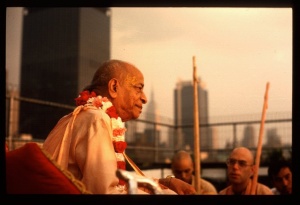SB 6.9.29-30: Difference between revisions
m (1 revision(s)) |
(Vanibot #0054 edit - transform synonyms into clickable links, which search similar occurrences) |
||
| (One intermediate revision by one other user not shown) | |||
| Line 1: | Line 1: | ||
{{info | {{info | ||
|speaker= | |speaker=Śukadeva Gosvāmī | ||
|listener=King | |listener=King Parīkṣit | ||
}} | }} | ||
[[Category:Srimad-Bhagavatam - Canto 06 Chapter 09]] | |||
[[Category:Bhagavatam Verses Spoken by Sukadeva Gosvami - Vanisource|060929]] | |||
<div style="float:left">'''[[Srimad-Bhagavatam]] - [[SB 6|Sixth Canto]] - [[SB 6.9: Appearance of the Demon Vrtrasura|Chapter 9: Appearance of the Demon Vṛtrāsura]]'''</div> | |||
<div style="float:right">[[File:Go-previous.png|link=SB 6.9.28]] '''[[SB 6.9.28]] - [[SB 6.9.31]]''' [[File:Go-next.png|link=SB 6.9.31]]</div> | |||
{{RandomImage}} | |||
==== TEXTS 29-30 ==== | ==== TEXTS 29-30 ==== | ||
<div class="verse"> | |||
:ātma-tulyaiḥ ṣoḍaśabhir | |||
:vinā śrīvatsa-kaustubhau | |||
:paryupāsitam unnidra- | |||
:śarad-amburuhekṣaṇam | |||
:dṛṣṭvā tam avanau sarva | |||
:īkṣaṇāhlāda-viklavāḥ | |||
:daṇḍavat patitā rājañ | |||
:chanair utthāya tuṣṭuvuḥ | |||
dṛṣṭvā tam avanau sarva | |||
īkṣaṇāhlāda-viklavāḥ | |||
daṇḍavat patitā rājañ | |||
chanair utthāya tuṣṭuvuḥ | |||
</div> | </div> | ||
| Line 21: | Line 27: | ||
==== SYNONYMS ==== | ==== SYNONYMS ==== | ||
<div class="synonyms"> | |||
<div | ''[//vanipedia.org/wiki/Special:VaniSearch?s=ātma&tab=syno_o&ds=1 ātma]-[//vanipedia.org/wiki/Special:VaniSearch?s=tulyaiḥ&tab=syno_o&ds=1 tulyaiḥ]'' — almost equal to Himself; ''[//vanipedia.org/wiki/Special:VaniSearch?s=ṣoḍaśabhiḥ&tab=syno_o&ds=1 ṣoḍaśabhiḥ]'' — by sixteen (servants); ''[//vanipedia.org/wiki/Special:VaniSearch?s=vinā&tab=syno_o&ds=1 vinā]'' — without; ''[//vanipedia.org/wiki/Special:VaniSearch?s=śrīvatsa&tab=syno_o&ds=1 śrīvatsa]-[//vanipedia.org/wiki/Special:VaniSearch?s=kaustubhau&tab=syno_o&ds=1 kaustubhau]'' — the Śrīvatsa mark and Kaustubha jewel; ''[//vanipedia.org/wiki/Special:VaniSearch?s=paryupāsitam&tab=syno_o&ds=1 paryupāsitam]'' — being attended on all sides; ''[//vanipedia.org/wiki/Special:VaniSearch?s=unnidra&tab=syno_o&ds=1 unnidra]'' — blooming; ''[//vanipedia.org/wiki/Special:VaniSearch?s=śarat&tab=syno_o&ds=1 śarat]'' — of the autumn; ''[//vanipedia.org/wiki/Special:VaniSearch?s=amburuha&tab=syno_o&ds=1 amburuha]'' — like lotus flowers; ''[//vanipedia.org/wiki/Special:VaniSearch?s=īkṣaṇam&tab=syno_o&ds=1 īkṣaṇam]'' — having eyes; ''[//vanipedia.org/wiki/Special:VaniSearch?s=dṛṣṭvā&tab=syno_o&ds=1 dṛṣṭvā]'' — seeing; ''[//vanipedia.org/wiki/Special:VaniSearch?s=tam&tab=syno_o&ds=1 tam]'' — Him (the Supreme Personality of Godhead, Nārāyaṇa); ''[//vanipedia.org/wiki/Special:VaniSearch?s=avanau&tab=syno_o&ds=1 avanau]'' — on the ground; ''[//vanipedia.org/wiki/Special:VaniSearch?s=sarve&tab=syno_o&ds=1 sarve]'' — all of them; ''[//vanipedia.org/wiki/Special:VaniSearch?s=īkṣaṇa&tab=syno_o&ds=1 īkṣaṇa]'' — from directly seeing; ''[//vanipedia.org/wiki/Special:VaniSearch?s=āhlāda&tab=syno_o&ds=1 āhlāda]'' — with happiness; ''[//vanipedia.org/wiki/Special:VaniSearch?s=viklavāḥ&tab=syno_o&ds=1 viklavāḥ]'' — being overwhelmed; ''[//vanipedia.org/wiki/Special:VaniSearch?s=daṇḍa&tab=syno_o&ds=1 daṇḍa]-[//vanipedia.org/wiki/Special:VaniSearch?s=vat&tab=syno_o&ds=1 vat]'' — like a stick; ''[//vanipedia.org/wiki/Special:VaniSearch?s=patitāḥ&tab=syno_o&ds=1 patitāḥ]'' — fell; ''[//vanipedia.org/wiki/Special:VaniSearch?s=rājan&tab=syno_o&ds=1 rājan]'' — O King; ''[//vanipedia.org/wiki/Special:VaniSearch?s=śanaiḥ&tab=syno_o&ds=1 śanaiḥ]'' — slowly; ''[//vanipedia.org/wiki/Special:VaniSearch?s=utthāya&tab=syno_o&ds=1 utthāya]'' — standing up; ''[//vanipedia.org/wiki/Special:VaniSearch?s=tuṣṭuvuḥ&tab=syno_o&ds=1 tuṣṭuvuḥ]'' — offered prayers. | ||
ātma- | |||
</div> | </div> | ||
| Line 29: | Line 34: | ||
==== TRANSLATION ==== | ==== TRANSLATION ==== | ||
<div class="translation"> | |||
<div | |||
Surrounding and serving the Supreme Personality of Godhead, Nārāyaṇa, were sixteen personal attendants, decorated with ornaments and appearing exactly like Him but without the mark of Śrīvatsa and the Kaustubha jewel. O King, when all the demigods saw the Supreme Lord in that posture, smiling with eyes like the petals of lotuses grown in autumn, they were overwhelmed with happiness and immediately fell down like rods, offering daṇḍavats. Then they slowly rose and pleased the Lord by offering Him prayers. | Surrounding and serving the Supreme Personality of Godhead, Nārāyaṇa, were sixteen personal attendants, decorated with ornaments and appearing exactly like Him but without the mark of Śrīvatsa and the Kaustubha jewel. O King, when all the demigods saw the Supreme Lord in that posture, smiling with eyes like the petals of lotuses grown in autumn, they were overwhelmed with happiness and immediately fell down like rods, offering daṇḍavats. Then they slowly rose and pleased the Lord by offering Him prayers. | ||
</div> | </div> | ||
| Line 37: | Line 41: | ||
==== PURPORT ==== | ==== PURPORT ==== | ||
<div class="purport"> | |||
<div | |||
In Vaikuṇṭhaloka the Supreme Personality of Godhead has four hands and decorations like the Śrīvatsa mark on His chest and the gem known as Kaustubha. These are special indications of the Supreme Personality of Godhead. The Lord's personal attendants and other devotees in Vaikuṇṭha have the same features, except for the Śrīvatsa mark and the Kaustubha gem. | In Vaikuṇṭhaloka the Supreme Personality of Godhead has four hands and decorations like the Śrīvatsa mark on His chest and the gem known as Kaustubha. These are special indications of the Supreme Personality of Godhead. The Lord's personal attendants and other devotees in Vaikuṇṭha have the same features, except for the Śrīvatsa mark and the Kaustubha gem. | ||
</div> | </div> | ||
__NOTOC__ | |||
<div style="float:right; clear:both;">[[File:Go-previous.png|link=SB 6.9.28]] '''[[SB 6.9.28]] - [[SB 6.9.31]]''' [[File:Go-next.png|link=SB 6.9.31]]</div> | |||
__NOTOC__ | |||
__NOEDITSECTION__ | |||
Latest revision as of 22:46, 18 February 2024

A.C. Bhaktivedanta Swami Prabhupada
TEXTS 29-30
- ātma-tulyaiḥ ṣoḍaśabhir
- vinā śrīvatsa-kaustubhau
- paryupāsitam unnidra-
- śarad-amburuhekṣaṇam
- dṛṣṭvā tam avanau sarva
- īkṣaṇāhlāda-viklavāḥ
- daṇḍavat patitā rājañ
- chanair utthāya tuṣṭuvuḥ
SYNONYMS
ātma-tulyaiḥ — almost equal to Himself; ṣoḍaśabhiḥ — by sixteen (servants); vinā — without; śrīvatsa-kaustubhau — the Śrīvatsa mark and Kaustubha jewel; paryupāsitam — being attended on all sides; unnidra — blooming; śarat — of the autumn; amburuha — like lotus flowers; īkṣaṇam — having eyes; dṛṣṭvā — seeing; tam — Him (the Supreme Personality of Godhead, Nārāyaṇa); avanau — on the ground; sarve — all of them; īkṣaṇa — from directly seeing; āhlāda — with happiness; viklavāḥ — being overwhelmed; daṇḍa-vat — like a stick; patitāḥ — fell; rājan — O King; śanaiḥ — slowly; utthāya — standing up; tuṣṭuvuḥ — offered prayers.
TRANSLATION
Surrounding and serving the Supreme Personality of Godhead, Nārāyaṇa, were sixteen personal attendants, decorated with ornaments and appearing exactly like Him but without the mark of Śrīvatsa and the Kaustubha jewel. O King, when all the demigods saw the Supreme Lord in that posture, smiling with eyes like the petals of lotuses grown in autumn, they were overwhelmed with happiness and immediately fell down like rods, offering daṇḍavats. Then they slowly rose and pleased the Lord by offering Him prayers.
PURPORT
In Vaikuṇṭhaloka the Supreme Personality of Godhead has four hands and decorations like the Śrīvatsa mark on His chest and the gem known as Kaustubha. These are special indications of the Supreme Personality of Godhead. The Lord's personal attendants and other devotees in Vaikuṇṭha have the same features, except for the Śrīvatsa mark and the Kaustubha gem.